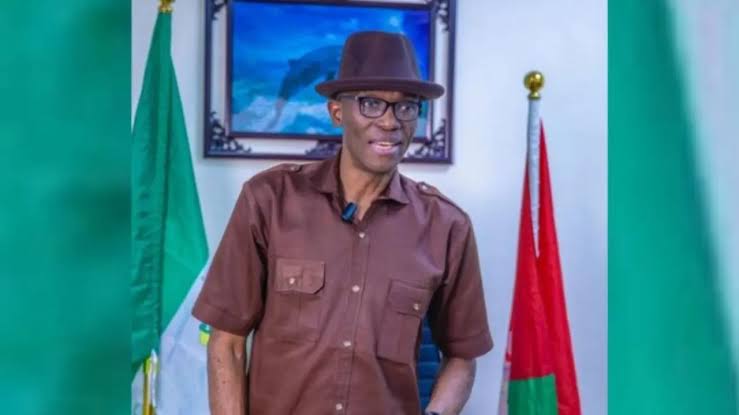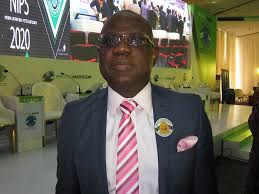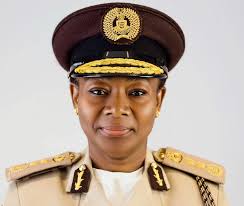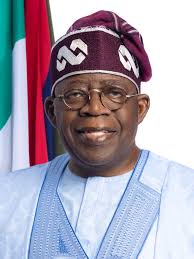Nigeria News
Supreme Court Nullifies Julius Abure’s Position as Labour Party National Chairman
4th April, 2025 at 13:23
By Our Reporter
 Abuja, April 4, 2025 – In a landmark ruling today, the Supreme Court of Nigeria set aside a previous Court of Appeal judgment that had recognized Julius Abure as the National Chairman of the Labour P
Abuja, April 4, 2025 – In a landmark ruling today, the Supreme Court of Nigeria set aside a previous Court of Appeal judgment that had recognized Julius Abure as the National Chairman of the Labour P
 Abuja, April 4, 2025 – In a landmark ruling today, the Supreme Court of Nigeria set aside a previous Court of Appeal judgment that had recognized Julius Abure as the National Chairman of the Labour Party (LP). The unanimous decision, delivered by a five-member panel of the apex court, marks a significant turning point in the leadership tussle within one of Nigeria’s prominent political parties.
Abuja, April 4, 2025 – In a landmark ruling today, the Supreme Court of Nigeria set aside a previous Court of Appeal judgment that had recognized Julius Abure as the National Chairman of the Labour Party (LP). The unanimous decision, delivered by a five-member panel of the apex court, marks a significant turning point in the leadership tussle within one of Nigeria’s prominent political parties.The Supreme Court held that the issue of leadership within the Labour Party is an internal affair, over which courts lack jurisdiction. The panel further noted that Abure’s tenure as National Chairman had already expired, rendering the Court of Appeal’s earlier pronoun inppropriatecement invalid. Consequently, the court dismissed a cross-appeal filed by the Abure-led faction of the LP, deeming it unmeritorious.
The ruling has elicited varied reactions across the political landscape. Senator Nenadi Usman, Chairman of the Labour Party Caretaker Committee, hailed the verdict as “a triumph for democracy and the rule of law.” In a statement, she emphasized that the decision reinforces the party’s commitment to justice and unity, urging members to focus on the broader goal of building a better Nigeria. “This is not a time for triumphalism—there is no victor and no vanquished,” Usman said, calling for reconciliation within the party.
However, the Labour Party, in a surprising twist, issued a statement asserting that Julius Abure remains its National Chairman. The party argued that the Supreme Court’s ruling emphasized the autonomy of political parties to determine their leadership, suggesting that the verdict did not explicitly remove Abure from his position. “Dr. Julius Abure is still the National Chairman of the Labour Party,” the statement read, sparking speculation of further internal disputes.
The verdict comes amid ongoing tensions within the Labour Party, which has been grappling with factionalism and leadership disputes. Political analysts suggest that the ruling could either pave the way for reconciliation or deepen the party’s divisions as it prepares for future electoral contests.
As of now, the Labour Party remains a key player in Nigeria’s political scene, closely associated with the Nigerian Labour Congress (NLC). The implications of today’s Supreme Court decision are expected to unfold in the coming weeks, as party stakeholders navigate the next steps in resolving the leadership crisis.
Major Shake-Up at NNPCL: Mele Kyari Out, Bayo Ojulari Takes Helm as Group CEO
2nd April, 2025 at 06:12
By Our Reporter
 Abuja, April 2, 2025 – In a dramatic turn of events, President Bola Ahmed Tinubu has approved a sweeping reconstitution of the Nigerian National Petroleum Company Limited (NNPCL) board, marking a si
Abuja, April 2, 2025 – In a dramatic turn of events, President Bola Ahmed Tinubu has approved a sweeping reconstitution of the Nigerian National Petroleum Company Limited (NNPCL) board, marking a si
 Abuja, April 2, 2025 – In a dramatic turn of events, President Bola Ahmed Tinubu has approved a sweeping reconstitution of the Nigerian National Petroleum Company Limited (NNPCL) board, marking a significant shake-up in the leadership of Nigeria’s state-owned oil giant. The overhaul sees the removal of Group Chief Executive Officer Mallam Mele Kolo Kyari and Chairman Chief Pius Akinyelure, along with all board members appointed in November 2023, signaling a bold shift in the administration’s approach to the energy sector.
Abuja, April 2, 2025 – In a dramatic turn of events, President Bola Ahmed Tinubu has approved a sweeping reconstitution of the Nigerian National Petroleum Company Limited (NNPCL) board, marking a significant shake-up in the leadership of Nigeria’s state-owned oil giant. The overhaul sees the removal of Group Chief Executive Officer Mallam Mele Kolo Kyari and Chairman Chief Pius Akinyelure, along with all board members appointed in November 2023, signaling a bold shift in the administration’s approach to the energy sector.The announcement, made early Wednesday, April 2, 2025, has sent ripples through Nigeria’s oil industry. Replacing Kyari is Engr. Bashir Bayo Ojulari, who steps in as the new Group Chief Executive Officer, while Ahmadu Musa Kida has been appointed as the non-executive chairman. The newly reconstituted 11-member board is tasked with steering NNPCL toward greater efficiency and transparency, amid ongoing debates over the company’s financial management and operational performance.
Kyari, who had led NNPCL since July 2019, oversaw its transition from the Nigerian National Petroleum Corporation to a limited liability company under the Petroleum Industry Act of 2021. His tenure was marked by efforts to boost domestic refining capacity, including the rehabilitation of the Port Harcourt and Warri refineries, and navigating complex crude-for-loan deals. However, his leadership faced criticism over allegations of financial irregularities—most notably from the Auditor-General of the Federation, who accused NNPCL of diverting ?2.68 trillion and $9.77 million between 2019 and 2023—and the controversial Naira-for-Crude policy, which some argued undermined local refineries.
The shake-up comes on the heels of recent developments that underscored tensions within the sector. Just last week, on March 27, NNPCL’s Chief Corporate Communications Officer, Olufemi Soneye, announced that the company was in the final stages of preparing for an Initial Public Offering (IPO), a move aimed at listing its shares on the capital market. The timing of the leadership change has sparked speculation about whether it is linked to the IPO preparations or broader strategic realignments ahead of anticipated economic reforms.
Engr. Bashir Bayo Ojulari, the incoming GCEO, brings a wealth of experience in petroleum engineering and project management, having previously held senior roles in upstream operations. His appointment is seen as an effort to inject technical expertise into NNPCL’s leadership, with a focus on optimizing production and addressing the growing domestic demand for crude, particularly from operational refineries like Dangote, Port Harcourt, and Warri. Ahmadu Musa Kida, the new chairman, is a seasoned administrator with a background in sports governance, which some analysts suggest may reflect a push for a fresh, outsider perspective on the board.
Public reaction has been swift and varied. Posts on X reflect a mix of surprise and cautious optimism, with some users hailing the move as “the end of an era and the birth of a new one,” while others question the timing and motives behind the shake-up. The Concerned Citizens Forum, which previously called for a state of emergency on NNPCL’s leadership, may see this as a response to their demands, though no official statement from the group has been released as of 6:02 AM WAT.
The new board’s immediate challenges include stabilizing fuel supply, resolving outstanding debts tied to crude-for-loan agreements, and ensuring the IPO proceeds as planned. With Nigeria’s oil sector attracting $17 billion in foreign investment in 2024 alone, according to NNPCL’s earlier reports, the stakes are high for Ojulari and his team to deliver on President Tinubu’s vision for a revitalized energy industry.
As of now, no official reason has been provided for Kyari and Akinyelure’s removal, though sources close to the presidency hint at a desire to reset NNPCL’s trajectory amid mounting economic pressures. Further details on the new board’s composition and their first actions are expected later today, as Nigeria watches closely to see how this shake-up will reshape its oil landscape.
President Tinubu Extends Comptroller-General Kemi Nanna Nandap’s Tenure at Nigeria Immigration Service
31st March, 2025 at 19:23
By Our Reporter
 Abuja, March 31, 2025 – President Bola Ahmed Tinubu has approved an extension of tenure for Mrs. Kemi Nanna Nandap as the Comptroller-General of the Nigeria Immigration Service (NIS), extending her l
Abuja, March 31, 2025 – President Bola Ahmed Tinubu has approved an extension of tenure for Mrs. Kemi Nanna Nandap as the Comptroller-General of the Nigeria Immigration Service (NIS), extending her l
 Abuja, March 31, 2025 – President Bola Ahmed Tinubu has approved an extension of tenure for Mrs. Kemi Nanna Nandap as the Comptroller-General of the Nigeria Immigration Service (NIS), extending her leadership role until December 31, 2026. The announcement was made today, reflecting the administration’s confidence in her transformative leadership and the progress achieved under her stewardship.
Abuja, March 31, 2025 – President Bola Ahmed Tinubu has approved an extension of tenure for Mrs. Kemi Nanna Nandap as the Comptroller-General of the Nigeria Immigration Service (NIS), extending her leadership role until December 31, 2026. The announcement was made today, reflecting the administration’s confidence in her transformative leadership and the progress achieved under her stewardship.Mrs. Nandap, who began her career with the NIS on October 9, 1989, was initially appointed as Comptroller-General by President Tinubu on March 1, 2024, with her original term set to conclude on August 31, 2025. The extension, which adds over a year to her tenure, was detailed in a statement issued by Bayo Onanuga, Special Adviser to the President on Information and Strategy.
Under Nandap’s leadership, the Nigeria Immigration Service has recorded significant advancements in its core mandate. Notable improvements include enhanced border management, modernization of immigration processes, and strengthened national security measures. These achievements have been widely recognized as aligning with President Tinubu’s Renewed Hope Agenda, which emphasizes security, efficiency, and service delivery.
“President Tinubu commended the Comptroller-General for her exemplary leadership,” the statement read, highlighting her dedication and the tangible progress made during her tenure. The President urged Mrs. Nandap to remain committed to the strategic priorities of the NIS, including protecting Nigeria’s territorial integrity and promoting safe, legal, and orderly migration.
The tenure extension comes at a time when the NIS continues to play a critical role in national security and immigration management, bolstered by recent initiatives such as the commissioning of the Bola Ahmed Tinubu Technology Innovation Complex (BATTIC) in December 2024. This facility has enhanced the Service’s capacity to link government agencies and improve border monitoring.
Mrs. Nandap’s career, spanning over three decades, has been marked by steady growth and impactful reforms. Her extended tenure is expected to further consolidate these gains, ensuring continuity in the Service’s modernization efforts. President Tinubu reaffirmed his administration’s commitment to supporting the NIS in fulfilling its mandate, signaling a sustained focus on immigration as a cornerstone of national development.
Tinubu at 73: Nigerian President Marks Birthday with Prayer, Renewed Hope for Nation
30th March, 2025 at 18:26
By Our Reporter
 On March 29, 2025, Nigeria's President, Bola Ahmed Tinubu, celebrated his 73rd birthday, marking the occasion with a blend of spiritual reflection and a renewed commitment to the nation's progress. Bo
On March 29, 2025, Nigeria's President, Bola Ahmed Tinubu, celebrated his 73rd birthday, marking the occasion with a blend of spiritual reflection and a renewed commitment to the nation's progress. Bo
 On March 29, 2025, Nigeria's President, Bola Ahmed Tinubu, celebrated his 73rd birthday, marking the occasion with a blend of spiritual reflection and a renewed commitment to the nation's progress. Born on March 29, 1952, Tinubu has been a prominent figure in Nigerian politics for decades, rising from his early career as an accountant and senator to becoming the 16th President of the Federal Republic of Nigeria in 2023. His birthday this year coincided with the holy month of Ramadan, adding a layer of significance to the celebrations.
On March 29, 2025, Nigeria's President, Bola Ahmed Tinubu, celebrated his 73rd birthday, marking the occasion with a blend of spiritual reflection and a renewed commitment to the nation's progress. Born on March 29, 1952, Tinubu has been a prominent figure in Nigerian politics for decades, rising from his early career as an accountant and senator to becoming the 16th President of the Federal Republic of Nigeria in 2023. His birthday this year coincided with the holy month of Ramadan, adding a layer of significance to the celebrations.
Rather than opting for lavish festivities, President Tinubu chose a more subdued and meaningful observance by joining Muslim faithful at the National Mosque in Abuja on Friday, March 28, for a special prayer session. This event was not only a personal milestone but also an opportunity to seek divine guidance for Nigeria during a challenging period marked by economic reforms and security concerns. Accompanied by Vice President Kashim Shettima, senior government officials, and leaders of the All Progressives Congress (APC), Tinubu used the occasion to pray for the country's stability, peace, and prosperity. He expressed gratitude to Almighty Allah for his life and the privilege of leading Nigeria, emphasizing his dedication to hard work and prayer as key pillars of his leadership.
In a statement released by his Special Adviser on Information and Strategy, Bayo Onanuga, Tinubu urged Nigerians to join him in spirit by offering prayers for unity and healing, reinforcing a collective commitment to the nation's future. He reflected on his administration’s efforts, now approaching its second anniversary, to advance economic recovery, strengthen national security, and consolidate democratic gains. "My heart is filled with Renewed Hope for Nigeria," he said, echoing the theme of his presidency while acknowledging the support and goodwill of Nigerians.
The birthday drew warm messages from across the country. Former President Muhammadu Buhari, in a phone call, praised Tinubu’s political legacy and their long-standing collaboration, expressing pride in his leadership. First Lady Oluremi Tinubu hailed her husband as her "Knight in Shining Armor," celebrating his courage and resilience. Prominent figures like General Ibrahim Babangida and Senate President Godswill Akpabio also lauded his dedication to democracy and problem-solving leadership, with Babangida calling him the "Asiwaju of the Universe."
Tinubu’s 73rd birthday was more than a personal celebration; it was a moment of national reflection. Amidst ongoing challenges, his call for unity and prayer underscored his vision of a Nigeria where every citizen thrives, blending his personal milestone with a broader hope for the country’s future.

